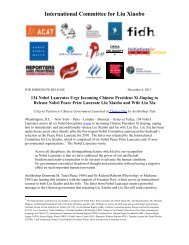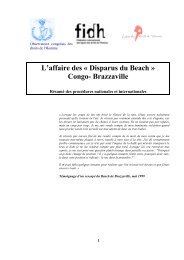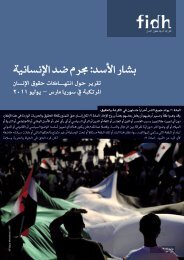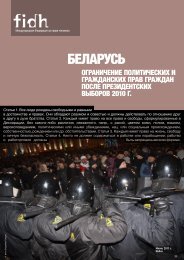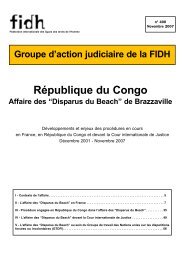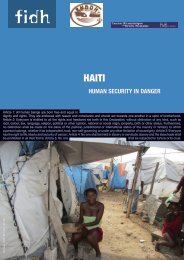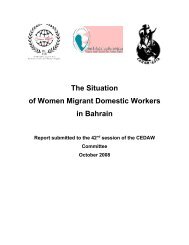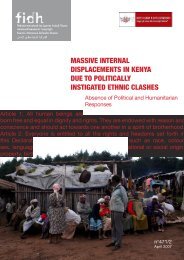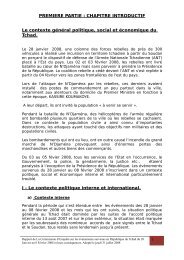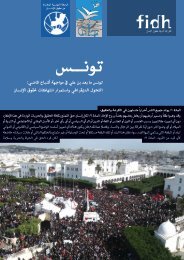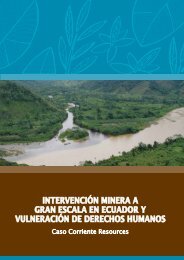KYRGYZStAN - FIDH
KYRGYZStAN - FIDH
KYRGYZStAN - FIDH
- No tags were found...
You also want an ePaper? Increase the reach of your titles
YUMPU automatically turns print PDFs into web optimized ePapers that Google loves.
II. THE DANGEROUSPRECEDENT OFPOLITICALLY-ORIENTEDJUSTICEIn order to take the measure of the human rights violations and their political and judicialimplications, it is necessary to analyse the events of April 7 2010 that led to the ousting ofthe Bakiyev government. Analysts and participants hold diverging views on the causes ofthe violence and the responsibilities involved. Some emphasise the popular and spontaneousnature of the uprising, while others point to underhand foreign intervention. In anycase there has to be an independent enquiry to determine the facts and to bring to justicewhoever may prove guilty.II.1 The symbolic measures adopted by the InterimgovernmentIn view of the popular demonstrations, President Bakiyev fled to the south of the country,in the Djalal-Abad region. Faced with the vacancy of power, the leaders of the oppositionhastened to organise an Interim government, led by Roza Otunbaeva. Despite the circumstancesof its coming to power and the anxiety caused by its intention to concentrate inits hand all the powers of the State 22 , the Interim government, invoking the mandate givento it by the popular uprising, was intent on marking the democratic change compared tothe preceding regime. In the climate of radical change that prevailed after April 2010, themain freedoms were comprehensively restored. The legal bases for such changes howeverwere uncertain, in the absence of any legislative body independent of the Interim government(Parliament having been dissolved by Decree n°1). And so when, in June 2010,members of the human rights organisation “Citizens Against Corruption” were asked “Onwhat legislation is based the freedom of association?” they answered “What legislation?In this country we do not even have a Constitution yet, there is no legislation!” Symbolicmeasures, in sharp contrast with the Bakiyev regime, were rapidly adopted. Political trialswere abandoned: General Ismail Isakov, a former Minister of Defence who had joined theopposition in October 2008, charged with “corruption” and sentenced to eight years’ imprisonmenton January 11 2010, was set free on April 7 and appointed Minister of Defencein the Interim government 23 . The charges against him were dropped on April 15, 2010 bydecision of the Military High Court. The “Nookat prisoners”, a group of 32 activists in theOsh region sentenced in 2008 for “Islamist extremism” 24 , were released on May 17, underthe amnesty decree issued on April 26. Their sentencing had become the symbol of theexcesses of the Bakiyev regime’s fight against extremism, arousing fears that Kyrgyzstanmight align itself on the repressive policies against religious activities of its neighbours,and their liberation had the same symbolic importance, arousing hopes for the democraticfuture of the country.22. Decree n°1 on the constitution of an Interim government, 07.04.2010.23. He resigned on July 20, 2010, in order to be able to stand for Parliament in October 2010.24. See <strong>FIDH</strong> Report Kazakhstan / Kyrgyzstan. Exploitation of migrant workers, protection denied to asylum seekers and refugees. <strong>FIDH</strong>,October 2009. pp. 14-15, http://www.fidh.org/IMG/pdf/Kazakhstan530a.pdfThe wave of censorship that had hit the media in March 2010 to forestall the mobilisationof the opposition for the fifth anniversary of the “Tulip revolution” was lifted the dayafter power changed hands. On April 12, 2010 the Kyrgyz service of Radio Free Europe/Radio Liberty, Azattyk, was again authorised to broadcast on Kyrgyz territory. On theInternet the blocking of the main independent information websites, www.ferghana.ru,www.centrasia.ru, and the platform of the opposition newspaper “Bely Parus”, was lifted.By a symbolic decree issued on June 10, 2010 by the minister of the Interior, Bolot Sher,the Interim government abolished Department 9 of the Ministry of the Interior (MVD), setup to prevent extremism and to fight “Informational and ideological terrorism”. Under sucha vague mandate, however, it had concentrated on spying on political opponents anddrawing up “black lists”. Its agents were adept at tailing and wire-tapping. The MVD pressservice promised “henceforth the ministry’s departments will cease to monitor the ideas ofthe opposition in connection with the analysis of the socio-political situation” 25 .Dinara Oshurakhunova, president of the NGO “Coalition for Democracy and Civil Society”,welcomed the symbolic importance of the reform, but added that she was not much impressedby its practical consequences: “Nobody knows what has happened to the tons offiles, all the recordings… that Department 9 had collected. I myself certainly have a file inthe archives, but I do not know what it contains and I still have no access to it. Moreover,the recent wire-tapping scandals 26 clearly show that such practices are not done awaywith, and that the Interim government has no real control over the intelligence agencies.We shall need more than symbolic measures, the ministry of the Interior and the intelligenceagencies will have to be completely reformed. But that can only be envisaged oncethe country is stabilised…” 27And so the human rights defenders and the representatives of the civil society welcomethe new government’s commitment to democracy, while remaining vigilant concerning theconcrete impact of such changes. For the violence that led to the change of regime representsa founding political and judicial challenge for the Interim government. The symbolicmeasures it has adopted have not been accompanied by a true in-depth effort to determinethe criminal responsibilities and to allow justice to progress.II.2 A politically-oriented official enquiryIn the aftermath of the April events, the Interim government set up three parallel commissionsof enquiry, with different attributions. The Procuratura (Prosecutor's office) wasresponsible for the official judicial enquiry. A State Commission was charged with makinga political assessment of the April events. Lastly, the Kyrgyzstan Ombudsman, TursunbekAkun, was told to evaluate the social causes and consequences of the events. The fact ofhaving several structures for investigation and analysis certainly reflects a genuine desireto establish the truth, but it would also appear to add to the confusion between the variousmissions.By an order of the Interim government dated May 20, 2010, a State Commission for thecomprehensive examination of the causes and circumstances of the tragic events of Apriland May 2010 was set up, mandated to draw up a political assessment of the events. TheCommission was composed of several members of the Interim government, recently appointedofficials, political analysts, journalists and representatives of the civil society closeto the Interim government. Originally the Commission was supposed to hand in its reportby June 20, but the deadline was postponed several times (to September 20, accordingto information available at the time of drafting this report). The Commission is chaired by25. Ferghana.ru, 10.06.2010, “Kyrgyzstan: the ministry of the Interior abolishes the political intelligence department”,http://www.ferghana.ru/news.php?id=14908&mode=snews26. At the end of May, recordings of embarrassing telephone conversations between members of the Interim government, AlmazbekAtambaev, Azimbek Beknazarov and Temir Sariev, were made public. Those concerned had to defend themselves against charges ofcorruption. This shows that former members of the opposition are still being listened to, and that intelligence agencies do not hesitateto use their information for political purposes.27. Interview of Dinara Oshurakhunova, Bishkek, 21.06.2010.12 / KYRGYZSTAN <strong>FIDH</strong> – KYRGYZSTAN / 13




